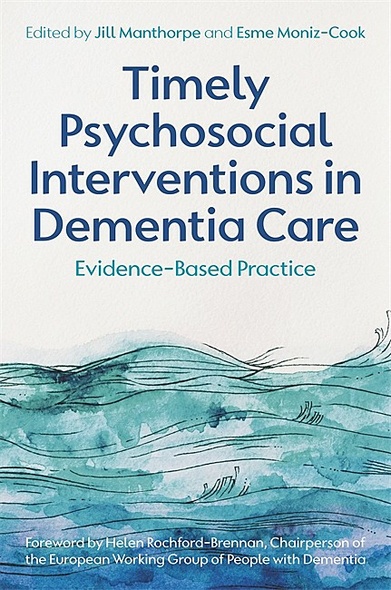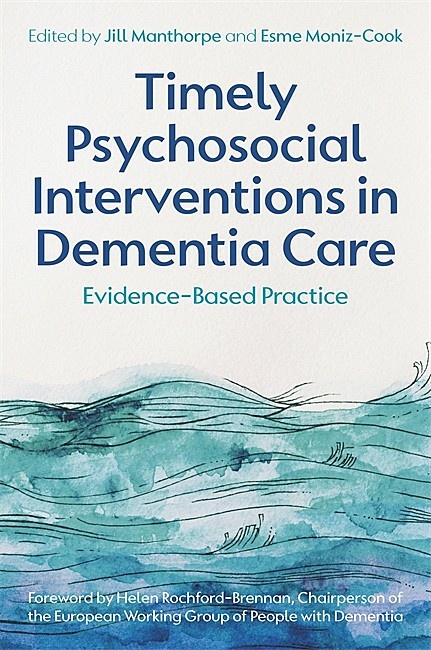Our shopping cart is currently down. To place an order, please contact our distributor, UTP Distribution, directly at utpbooks@utpress.utoronto.ca.
Timely Psychosocial Interventions in Dementia Care
Evidence-Based Practice
This new edited volume seeks to meet the growing need for ways to support people with dementia across the whole course and trajectory of dementia care, with a wide scope of expertise.
The book addresses how professionals, carers and families can apply psychosocial interventions - which take into consideration the individual, social and environmental aspects of a person's life - across this trajectory, right from the earliest stages through to practice in care home settings.
Divided into four sections, each covers a different context in which people with dementia can be supported: at home; in community settings; family and carer support; and those in care homes and hospitals. In addition, there is a distinct focus throughout on evidence-based practice and its implementation in real-world settings. This book is essential reading for any professional, carer or family member wanting to support people with dementia.
Esme Moniz-Cook is Professor of Psychology and Dementia Care Research at the Faculty of Health Sciences, University of Hull and founder Chair, now co-Chair of the Board of INTERDEM, an influential pan-European multi-professional applied research group dedicated to developing psychosocial approaches and support programmes for people with dementia and carers. She has worked in dementia care research and clinical services for over 30 years.
Jill Manthorpe is Professor of Social Work at King's College London and Director of the NIHR Health and Social Care Workforce Research Unit. She has worked in the voluntary sector and in education for many years, concentrating on services for older people. She was a member of the first NICE/SCIE dementia guidelines group and is a member of INTERDEM.
1. Timely support for people with dementia: New Agendas and Challenges - Professors Jill Manthorpe (NIHR Health and Social Care Workforce Research Unit, Policy Institute at King's, King's College London) & Esme Moniz-Cook (Faculty of Health Sciences, University of Hull)
2. Choosing psychosocial intervention for people with dementia and their families: Protocols for decision-making - Professor Esme Moniz-Cook and Dr Chris Rewston
3. Counselling people with dementia and their families at home: The DAISY programme - Ms Ane Eckermann & Professor Gunhild Waldemar (The Danish Dementia Research Centre, Rigshospitalet, University of Copenhagen, Denmark)
4. Meeting Centres and Dementia Cafés: community-based initiatives and social engagement - Professor Rose Marie Droes (Department of Psychiatry, VU University Medical Centre, Amsterdam, The Netherlands) & Professor Rabih Chattat (Dipartimento di Psicologia Viale Berti Pichat 5, Bologna, Italy) & Professor Stefanie Auer (Danube-University Krems, Faculty of Health and Medicine, Department for Clinical Neurosciences and Preventive Medicine, Krems, Austria)
5. Cognitive Stimulation Therapy (CST) for people with dementia living in the community - Dr Elisa Aguirre, Professor Aimee Spector (Division of Psychology & Language Sciences, University College London), Dr Amy Streater & Professor Martin Orrell
6. Promoting participation in meaningful occupation - Professor Gail Mountain (University of Bradford, Bradford, UK) & Dr Sarah Kate Smith
7. Goal-Oriented Cognitive Rehabilitation in Early-Stage Alzheimer's and Related Dementias - Dr Aleksandra Kudlicka (REACH: The Centre for Research in Ageing and Cognitive Health, University of Exeter, Exeter), Ms Suzannah Evans & Professor Linda Clare (REACH: The Centre for Research in Ageing and Cognitive Health, University of Exeter, Exeter)
8. Managing depression in people with early dementia: findings from a therapeutic trial - Professor Katja Werheid (Dept. of Psychology, Clinical Gerontopsychology, Humboldt-Universität zu Berlin, Germany), Dr Angelika Thöne-Otto (Clinic of Cognitive Neurology, University of Leipzig, Germany), Ms Johanne Tonga (Department of Old Age Psychiatry, Oslo University Hospital, Ullevaal, Norway) & Professor Alexander Kurz (Department of Psychiatry and Psychotherapy, Klinikum rechts der Isar, Technische Universität München, Germany)
9. Using Assistive Technology in dementia care - Dr Franka Meiland, Dr Henriëtte van der Roest & Professor Rose-Marie Dröes (all Department of Psychiatry, VU University Medical Centre, Amsterdam, The Netherlands)
10. Family meetings to prevent mood problems in family carers - Dr Karlijn J. Joling (VU University Medical Centre, Amsterdam, The Netherlands) & Professor Hein P.J. van Hout (Department of General Practice and Elderly Care medicine, Vrije University, Amsterdam, The Netherlands)
11. Supporting the supporters: interventions to reduce family distress - Dr Ingun Ulstein (The Memory Clinic, Department of Geriatric Medicine, Oslo University Hospital, Ullevål, Norway), Professor Jill Manthorpe & Professor Esme Moniz-Cook
12. Supporting People with dementia through music - Dr Alfredo Raglio (Department of Psychology, Catholic University, Milan, Italy), Dr Maria Gianelli, Professor Esme Moniz-Cook & Professor Jill Manthorpe
13. Dancing with People with Dementia - Professor Iva Holmerová (Center of Expertise in Longevity and Long Term Care (CELLO), Charles University, Prague Czech Republic), Dr Hana Vanková, Dr Dana Hradcová, Mr Michal Šteffl & Mr Petr Veleta
14. Psychosocial interventions to reduce depression and apathy among people with dementia living in care homes: Act in case of Depression - Debby Gerritsen (Radboud University Medical Center, Radboud University Nijmegen, The Netherlands) & Ruslan Leontjevas
15. Improving the physical environment of care homes: the Eval'zheimer© model of intervention design guidelines - Dr Kevin Charras (Fondation Médéric Alzheimer, Paris, France)
16. Making contact with people with severe dementia: miMakkus: a clowning intervention - Irena Draskovic (Radboud University Medical Center, Department of Neurosurgery, Radboud University Nijmegen, The Netherlands), Sytse Zuidema (University Medical Center Grooningen, The Netherlands), Annemieke van Brunschot (miMakkus foundation, Eindhoven, The Netherlands), Caren Mannens (miMakkus foundation, Eindhoven, The Netherlands) & Myrra Vernooij-Dassen (Radboud University Medical Centre, Scientific Institute for Quality of Healthcare Radboud University Nijmegen, The Netherlands)
17. Promoting the enjoyment of food in dementia care: the Bon Appetit intervention in care homes - Dana Hradcová (Center of Expertise in Longevity and Long Term Care (CELLO), Charles University, Prague Czech Republic), Michal Synek, Iva Holmerová (Center of Expertise in Longevity and Long Term Care (CELLO), Charles University, Prague Czech Republic) & Jitka Zgola
18. AwareCare: an awareness-based staff training intervention to improve quality of life for care home residents with severe dementia - Dr Catherine Quinn (University of Bradford; Bradford, UK) & Professor Linda Clare (REACH: The Centre for Research in Ageing and Cognitive Health, University of Exeter, Exeter)





